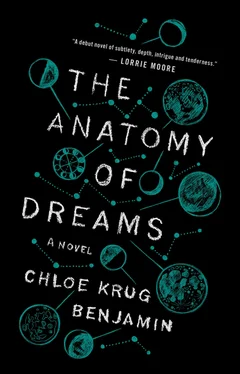Usually, we went to the lab around seven, a couple of hours before the participant went to sleep. It was our job to explain the procedure, soothe them—you’d be amazed how many seemed to treat the experiments like therapy—bring them water, if they asked for it, but no food. Often, the anxious ones asked for Gabe instead of me. I was more businesslike, explaining the procedure matter-of-factly, but Gabe didn’t talk about the study. Instead, he got the participants to talk about their children, their partners, their ailing parents. Once they fell asleep, I monitored the polysomnogram in an adjoining room while Gabe stayed next to the bed, watching closely for signs of movement or speech and intervening as necessary.
On days when we didn’t have a procedure scheduled, we worked at the university sleep clinic with Keller, where our tasks were more routine. Some of the higher-ups at the clinic knew about our project, which had been commissioned by the Center for Neuroscience, but most of them didn’t. They didn’t seem to find our caginess odd—it wasn’t uncommon for researchers to keep their work close to their chests—but I can see now that it prevented us from feeling at home in the university community. The department’s interest in Keller’s work had been a surprise: his research was so experimental that getting mainstream validation was always an uphill battle, and we felt like we were working on borrowed time.
We worked in the lab about four nights a week, and on those days we slept from the time we got home until early afternoon. We had brought our eclipse curtains with us from Fort Bragg, made of a tightly woven fabric that blocked light completely. It was part of our work to be interested in dreams, and we always listened intently to each other’s stories—not that I had many. I was rarely able to remember them; no matter how vivid my dreams felt at the time, they slipped through my hands in the morning. All I had was a faint sense of space and emotional residue that lingered, like a bad taste in the mouth. Gabe dreamed, most often, of transportation: helicopters and planes, commuter trains, and ships that crossed vast bodies of water with impossible speed.
When he told me about them, he looked not at me but at the ceiling, or out the window to the neighbor’s house, an arm bent behind his neck. He was my height, five feet seven, and by then he was stocky and muscular, with a head that almost looked to be too large for his body. With me, his face softened: his mouth untensing, the wide-set brown eyes, which narrowed when we worked, becoming gentler and more open. Other women seemed to find him attractive, though I suspected that had less to do with the way he looked than with his confidence. He was decisive and convincing in speech, but he could also drop into a low tone of intimacy that was, for Keller’s participants especially, profoundly comforting.
We worked in the old neuroscience building, a mile away from the quad of undergraduate classrooms and dorms near State Street. It was a flat, drab structure the color of brown eggs. Most neuroscience operations had transferred to a newly constructed, multistory building closer to the heart of campus, but this one still housed experiments, and Keller had a five-room complex in its north wing. Only one of the rooms had windows, so the wing felt like a collection of cells.
A petite, red-haired woman and an older Hungarian man conducted experiments in other parts of the building. I never knew exactly what they did, but I always stopped and made small talk when I saw them. In fact, I was rarely the one to end a conversation with anybody; I became so friendly with two of the checkout men at our local grocery co-op that Gabe accused me of flirting. I denied it at the time, but perhaps I was—flirting not with them, but with the idea of another life. We kept such irregular hours that neither of us had much opportunity to develop outside friendships.
This was the way our lives went for that first month of August—muggy, static days filled with fatigue and the little caffeine pills Gabe bought online—so I would probably have been grateful for any shift in our routine. It just happened that the shift came in the form of Thomas and Janna.
I remember the evening they arrived because there was a terrible thunderstorm, the kind I learned was common during Midwest summers. The rain was warm and steady, but the sounds were violent: great, piercing cracks, the taut sky shot open. Thunder like this used to terrify Bo, my family’s dog; I had always talked in my sleep, and my brother told me I often comforted Bo in that state. I was packing dinner for the lab with Gabe, thinking about Bo cowering in the closet, when we heard the garage door open next door.
Instinctively, we gathered at the kitchen window to watch. We’d been wondering about the neighbors. Gabe thought they were a family band, folk performers gone until the children were required to be back in school. Hypothesizing about them gave us a small, secret pleasure, like reading a cheap magazine, and when we heard the garage door, I thought they might be better left unknown. Whoever got out of the car would certainly be more ordinary than we’d hoped.
It was a small blue Honda with a bent-in bumper. Before it reached the garage, the car halted abruptly, and the passenger door swung open. A pair of shoes hit the pavement, and that was when we first saw Janna. She was a tall woman, practically at eye level with our kitchen window and maybe ten feet away, though she wasn’t looking at us. First she stomped several times; then she grabbed the bottom of her white, sack-shaped dress and shook it, as if brushing out crumbs. She wore chunky motorcycle boots, laced and buckled up to her knees. The combination of the black boots and white dress made her look eerily spectral. Up close, I would see her skin was very pale, with undercurrents of veins so visible it seemed she lacked a layer the rest of us had. Her light hair was shot through with red and black; in the rain, the blond parts were almost translucent. She turned and walked inside before I could see her face.
Next, there was Thom, coming out of the garage as the wide door descended behind him. He was even taller than her and slender, his reddish-blond hair matted like grass. Behind him, he pulled two suitcases, his shoulders hunched. He wore a white T-shirt, blue-striped scrubs, and scuffed brown moccasins. Right before he reached the porch, he pulled off his round glasses and held them up to the rain. Then he ducked through the screen door and rubbed them with the underside of his T-shirt, leaving the suitcases outside to be splattered. When he finished, he slipped the glasses on again, hoisted the suitcases onto the porch, and walked into the house. The lights inside came on just as he disappeared from view.
“Bad trip,” joked Gabe, turning away from the window.
“Maybe she felt sick,” I said.
I was still looking; I thought one of them might open the drapes, and then I felt silly. It was night—who opened the drapes at night?
“Could have at least helped him with the bags,” Gabe said.
He wrapped our sandwiches in foil and put them in the cooler. I was filling water bottles up from the tap. The water was cloudy and tasted faintly metallic, but the landlord said this was normal.
“How old do you think they are?” I asked. “About our age?”
“Probably,” said Gabe. “Late twenties, I’d say.”
We were twenty-four. Most of the neuroscientists we worked with were in their fifties and sixties, and Keller was over fifty himself.
A light came on in the second floor of the neighbor’s house. Gabe and I leaned toward the kitchen window.
“What is it people do around here, when someone new moves into the neighborhood?” he asked. “Don’t they bring over a casserole?”
Читать дальше












